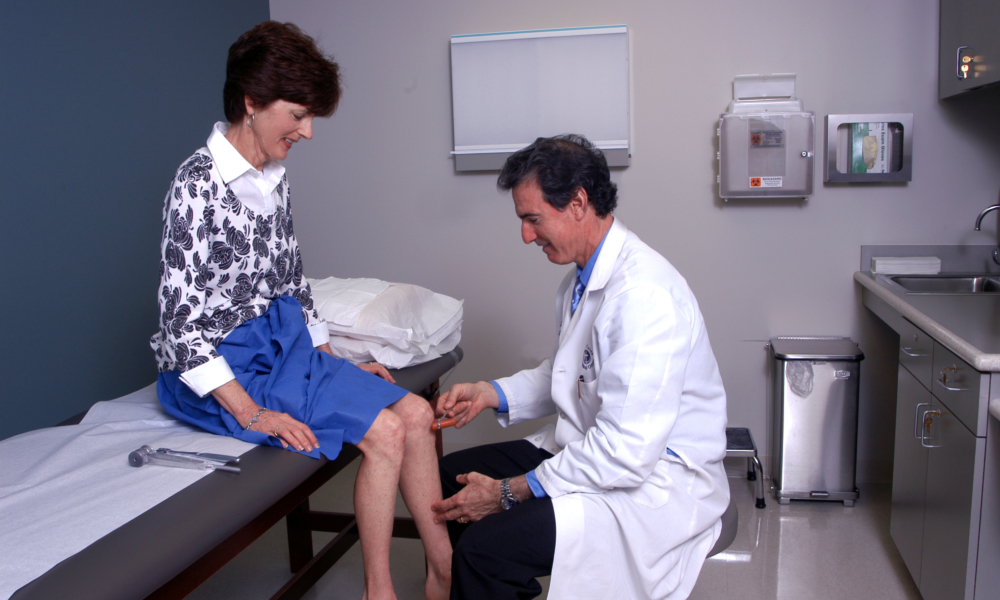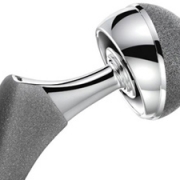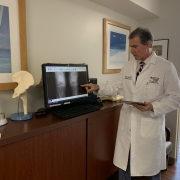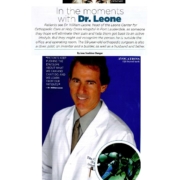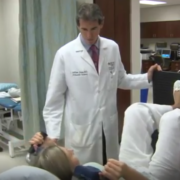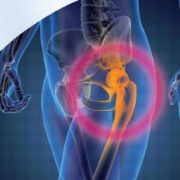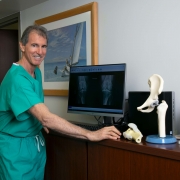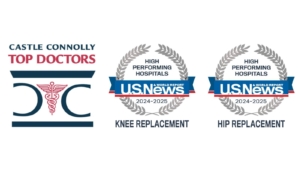Sharing Informative Questions and Comments from Our Readers
At The Leone Center for Orthopedic care, my staff and I have created a number of online platforms to provide information and answer patient questions: via email at LeoneCenter@holy-cross.com, our comprehensive informational blog and video gallery.
I have received so many insightful questions and comments that I thought it would be helpful to share them from time-to-time on my blog.
Question: Larry writes…
I had a left THR. The doctor used the posterior procedure. I’m now six weeks out and doing well. Not wanting to go through all the restrictions, I was considering anterior for my right hip, which would require not having it done locally since doctors here have been doing it for only 1 year. After reading your articles, I have decided not to have anterior. My doctor does not do mini posterior, therefore I have a 6″ incision. Not putting you on the spot, but would it be advantageous for me to drive 200 miles to have a consultation done by you?
Answer:
Hello Larry, if your surgeon did a great job that is something to respect. The actual length of the incision really is not important, but rather how well the components were implanted and the hip mechanics restored. It sounds like he did fabulous job. That being said, you should have the additional surgery where you feel you will have the best chance of doing well.
The size of the incision is determined by how large and tight the hip/thigh is and how much tissue (fat and muscle) exists between the bones of the hip and the overlying skin. Sometimes, when a surgeon is working too hard to reconstruct through a very small incision, the ends of the incision tear and the tissues are traumatized. This often leads to a less than optimal component position. Remember, what you’re hoping is to have a hip construct that will last 20 years or more. My strategy is to make as small an incision as possible, but one that allows for excellent exposure and reconstruction without brutalizing the tissues. Many times the difference between a good result and a great one is perfect component positioning and re-creating optimal hip mechanics.
Question: Teefah writes…
Hi. My left hip has been causing me severe pain since I was about 10 or 11 years old. I am now 19 and the pain keeps getting worse. My hip always cracks when I move it and I can’t stand for long periods of time. It is also very hard for me to walk. I have a limp. I have had X-rays and MRIs done and was told there was nothing wrong with me. They also told me that I need to exercise more. I recently started delivering newspapers and it seems as though the pain keeps on getting worse. Recently I have started to trip more often than I usually do and in places that don’t really make that much sense to me. I was wondering if you might have an idea as to what is causing me this severe pain. It has been going on for so long I don’t know what it feels like to have 2 hips free of pain.
Answer:
It is possible that your hip is causing the difficulties you are describing, but it also could be something masquerading as hip pathology. I recommend that you see an orthopedist who specializes in hip problems and has expertise in hip arthroscopy or joint preservation, perhaps even a pediatric orthopedist.
That doctor will want to review any X-rays or MRIs you have had. The quality of X-rays and MRIs continues to improve so depending on when you last had these studies done, the doctor might want them repeated. A simple intra-articular injection with a local anesthetic might be appropriate to help determine if the problems and symptoms you’re having are originating from the hip. If the pain is relieved even for a few hours and you find you can walk much easier and not limp, it would be a strong indicator that your hip is the problem.
Other important considerations include:
- if the symptoms are in one hip or both
- if you had hip problems as a baby
- is there a history of hip problems with other family members
- did symptoms start suddenly or after a particular activity or have they developed slowly
- do certain positions make the symptoms worse and can you relieve your symptoms by doing something else, such as resting or assuming a particular position
The history you can relate to your physician ultimately will help in figuring out exactly what is wrong and the treatment course.
If it is determined that your difficulties are due to a hip problem, every effort should be made to resolve the problem without joint replacement. A logical conservative or even surgical treatment regime can’t be outlined until the diagnosis is understood.
Question: Abe writes…
Hi. I am a 39-year old male and have been suffering with a right hip/knee problem for about 8 years or so. It has come and gone throughout the years but seems to be coming to a head as of recent and it is now hard to manage. Nothing in particular seems to make it come and go. The pain is on my right side and starts at my hip (and lower back) and travels down to my knee. Years ago I when I had this problem I would go to a chiropractor and he would adjust this area and it would go away. I’ve been going recently to a chiropractor for the same problem with no success. I really feel a lot of tension when I bend over or squat down either on the on the outside of the hip joint or at the location of my right psoas. Now it seems to be causing other problems with other parts of my body. I now have plantar fasciitis in both of my feet and my upper spine gets tight and pops really hard in 3 or for spots when I bend over at the waist. And, of course I have poor knees. Also, I have a pop in my hip when I extend my right leg. I have tried to work out with weight training but the next day my legs have this weird tingling feeling that can also be described as a very tense dull ache that seem to only hurt in my quad muscles.
From the research I have done, it seems that I have snapping hip, when a tendon is sliding over the hip joint and gets caught. I have always been very active and having this is very frustrating. I have not been to a doctor about it, and need some advice on what this could be before going somewhere.
Answer:
It is critical that the underlying etiology of your symptoms is understood before a course of action or treatment plan can be designed. From the description of your symptoms, a problem with your lower back versus your hip must considered. Because both of your quad muscles develop a “tense dull ache” associated with tingling, it could be that a nerve or nerves in your back have been compromised. In fact, pathology in the lower back region is very common. I would recommend you seek a medical physician, an orthopedist who specifically can assess your back and hip to help you define the underlying problem and then direct a treatment course.
Question: LL writes…
My active 60 year old husband is scheduled to have Mini posterior total hip replacement in 6 weeks. Our second opinion doctor performs traditional and Birmingham hip replacement. Because my husband has circulation problems in his leg and vein removed for open heart surgery last year…his surgeon recommended the Mini posterior surgery. After reading your blog I’m thankful he suggested this approach. Have you ever performed the Mini on a patient 1 year after major open heart surgery? My husband has a plastic valve (done in ’86) and synthetic ascending aorta and triple bypass (done in 2013)…very successful surgery. We have to get the okay from the cardiologist and get EKG, chest X-ray, etc. Just need reassurance…I am stressing he is fine.
Answer:
I have cared for many patients over the years with significant heart and peripheral vascular disease. It is important that these medical and cardiac conditions be optimized by your PCP and cardiologist preoperatively. Surgery carries increased risks because of these conditions, but by defining the risks and optimizing any underlying conditions, the risks can be minimized and hopefully managed. Similarly, an engaged medical team needs to be available to help with care after surgery. Although, personally I would feel strongly about reconstructing the hip through the mini posterior approach (there tends to be considerably less bleeding with this approach), other very caring and competent surgeons might feel just as strongly about using a different approach. I would recommend having an honest discussion with the surgeons you are considering.
Ultimately, you and your husband need to choose the surgeon who you both feel will provide the possible best care, based on reputation and your personal comfort level. I also recommend that you look at the track record and reputation of the hospital where the surgery will be performed, especially considering the underlying cardiac and vascular issues.
We thank you for your readership. If you would like a personal consultation, please contact our office at 954-489-4575 or by email at LeoneCenter@Holy-cross.com.

